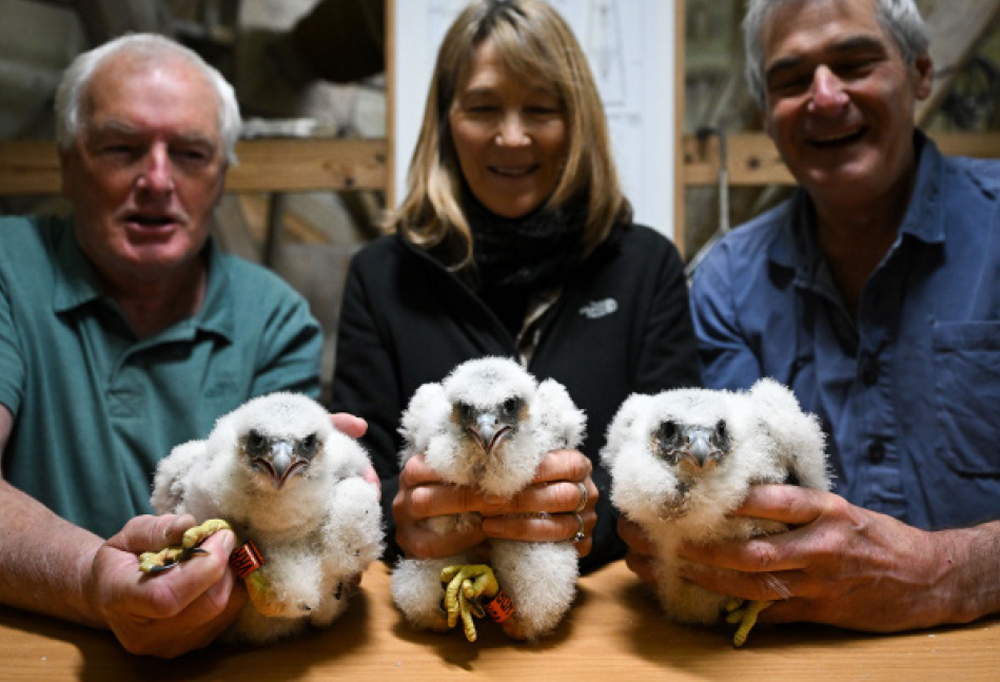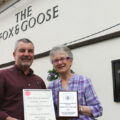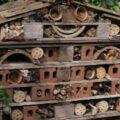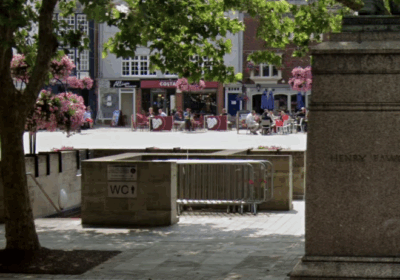The three peregrine chicks that hatched on the tower of Salisbury Cathedral last month were named and ringed today by Nigel Jones from the British Trust for Ornithology, assisted by Phil Sheldrake, the cathedral’s nature conservation adviser.
The chicks, which were around three weeks old at the time, were weighed, measured and fitted with a small metal British Trust for Ornithology (BTO) ring on their right leg, used for tracking/record-keeping, and a larger orange plastic Darvic ring bearing a unique two-letter ID on their left leg.
The Darvic ring allows anyone with sharp eyes, binoculars or a telescope to identify the falcons so that they can let the BTO know where they saw them and how they were.
Ringing is an important part of the cathedral’s peregrine project because it provides the BTO and cathedral staff with clues as to the secret lives of these magnificent birds, such as where they go and what they do.
The peregrines were also named during the ringing procedure. An initial shortlist themed around the coronation was provided by cathedral volunteers and on 12 May the choice was opened up to a public vote.
Six hundred and fifty-three people participated. The names, weight and ID details for each chick are as follows:
● Top choice for the single male chick was Rex (196 votes). Rex (Orange ID ring VDR) weighed in at a modest 655g. The name Rex was put forward by the Tuesday Morning and Thursday Afternoon Guiding teams. Latin for King, Rex seems a wholly appropriate name for the fastest member of the animal kingdom.
● Rose was the top choice for the females. Put forward by the Cathedral Volunteer Gardeners, Rose received 115 votes. The royal connection? The Right Revd Rose Hudson-Wilkin, Bishop of Dover and Bishop in Canterbury presented Queen Camilla with The Queen Consort’s Rod during the coronation ceremony in Westminster Abbey. The largest of all the chicks, Rose (Orange ID ring VHR) weighed in at a hefty 930g – not far off a kilo.
● Finally, the third chick, Lily, (Orange ID ring VRR), weighed a more modest 840g. The name Lily was put forward by the Cathedral Flower Arrangers because it is a symbol of purity, joy, love and sincerity, and one of the favourite flowers grown at Buckingham Palace, a flower frequently used in Royal Bouquets.
Now they have been ringed, the Salisbury chicks will remain on the south tower balcony for a further three weeks during which time they will start moving up and down the balcony, flapping their wings to strengthen them and growing their juvenile plumage.
One of the advantages of their penthouse nest is that by the time the chicks manage to fly up onto the balcony parapet they are pretty much ready to go. Occasionally a fledgling gets grounded after its first flight and is carried back up the tower to have another try.
Once fledged, the juveniles will stay around the cathedral for at least a month, learning survival and hunting skills from their parents before striking out on their own.
When fledging starts in early June, the South Wilts Local Group provides a fabulous peregrine themed Date with Nature experience on the cathedral’s west lawn.
A team of South Wilts RSPB volunteers armed with telescopes and information set up by the cathedral’s cloister entrance, offering visitors the opportunity to watch the juveniles close up and sharing their expert knowledge about these amazing birds.
Date with Nature runs from 11am to 4pm from Tuesday, 6th June. The dates are:
● Tuesday 6 to Saturday 10 June
● Monday 13 to Friday 16 June
● Monday 19 to Friday 23 June,
● Monday 26 to Friday 30 June, except Wednesday.











Leave a Reply